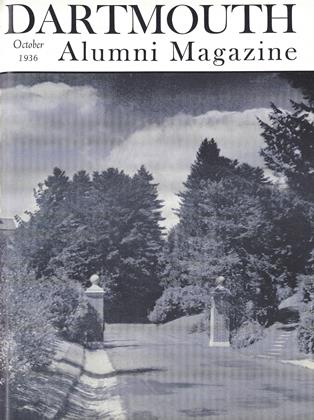England, by Eugene P. Chase '16. pp. vi, 260. Thomas Nelson & Sons, N. Y„ 1935.
Democratic Governments in Europe, of which the present volume on England is part, purposes "to describe and analyze the leading democracies of Europe," and "to show how the machinery of democracy has attempted to adapt itself to the growing technological demands of the time and how this machinery has sought to reconcile the necessity of expert administration with the demand for responsible government." In this study of British government Professor Chase has more than justified the faith of the editor of the series: his book is accurate (with a few minor lapses) in statement of fact, is penetrating in analysis and criticism, and is pleasing in style.
The general plan of the book is unusual: the first half is a description of the machinery of government—parliament, courts, local government, etc.—in the usual textbook fashion, with just enough historical background to show the main steps in the development of British governmental institutions, while the second half is almost entirely a narrative of the political and party history of the post-war period. The reader, therefore, first becomes acquainted with the mechanism of government, then he learns how it has functioned during these troubled years. Professor Chase's admiration for the British system—and for England itself—and his confidence in it is apparent, yet he is troubled by some aspects of the recent developments and is somewhat pessimistic concerning England ever again rising to her former political and economic position.
Space forbids comment on all of the pertinent questions that arise, or adequate comment on any of them. Three things may be mentioned which are of especial interest. (1) For some years it has been apparent to all students of British government that parliament as a vital and independent institution is being crushed between the cabinet and the electorate; furthermore the problems of today are so complicated that they cannot be solved by a "debating assembly": general rules only may be established, the administrative departments being given almost entire freedom in working out details (subject, of course, to ultimate parliamentary control). Political developments on the one hand, complex and technical problems on the other, seem to be changing the actual working of the traditional ministerial-parliamentary system which has for so long been the object of our admiration and respect. Professor Chase's discussion of this vital topic is lucid and discerning. (2) The rise of the Labor party, which has resulted in there being three major parties in the field, raises the question whether the old system of election and whether the parliamentary system itself can be adapted to care for this situation. The present strength of the parties in the country (election of 1929) is approximately 8, 8, 5, but the parliamentary representation was 288, 260, 59. The third party, which is the Liberal party, labors under an almost impossible handicap at the polls. So long, moreover, as the two major parties are of almost equal strength not only does the third party hold the balance of power, but any government is likely to be a "minority" government in relation both to popular vote and representation in parliament. It is evident that the present electoral system does not result in "representative" government. The remedy, of course, is proportional representation, and Professor Chase is an advocate of "P. R." The Liberal party is naturally clamoring for electoral reform —otherwise it is doomed. But while "P. R." would make parliament more representative, it might also confuse the parliamentary situation so that whereas at present it is only probable that a government would be dependent on the minority group, under proportional representation it would be almost impossible for any party to have a parliamentary majority. And "England does not love Coalitions." (3) Professor Chase is, seemingly, not an admirer of the Conservative party, yet he points out that, in spite of internal dissensions, the party is now distinctly liberal in its attitude toward social questions—at least in comparison with its former position—and that it will go as far in the "social-security" direction as is possible under the capitalistic system.
These are points which have been of particular interest to the present writer; other equally important and vital problems arise throughout the book. It is most enthusiastically recommended to all who are interested in problems of contemporary government; and the editor's introduction can be fully endorsed: "those who have misgivings as to the future of democracy should not form their opinions until they have read (this) scholarly and interesting study." Having done so, I think they will agree with Professor Chase's final word: "Whatever the future may be, the great mass of Englishmen look forward to it without dogmatism but with hope."
 View Full Issue
View Full Issue
More From This Issue
-
 Article
ArticleGradus Ad Parnassum
October 1936 By The Editor -
 Class Notes
Class NotesClass of 1921
October 1936 By Paul C. Belknap -
 Article
ArticlePresident Reviews Social Changes
October 1936 By CHARLES E. WIDMAYER '30 -
 Class Notes
Class NotesClass of 1886
October 1936 By Henry W. Thurston -
 Class Notes
Class NotesClass of 1911
October 1936 By Nathaniel G. Burleigh -
 Class Notes
Class NotesClass of 1930
October 1936 By Albert I. Dickerson
Books
-
 Books
BooksSamuel W. McCall, Governor of Massachusetts
November, 1916 -
 Books
BooksFACULTY PUBLICATIONS
April, 1923 -
 Books
BooksSOVIET MILITARY LAW AND ADMINISTRATION.
July 1955 By H. GORDON SKILLING -
 Books
BooksFINDING THE NEW WORLD
December 1935 By Harry B. Preston '05 -
 Books
BooksMY QUEST FOR FREEDOM
June 1945 By Herbert F. West '22 -
 Books
BooksTHE LIBERALIZATION OF AMERICAN PROTESTANTISM: A CASE IN COMPLEX ORGANIZATIONS.
MAY 1973 By RONALD M. GREEN


